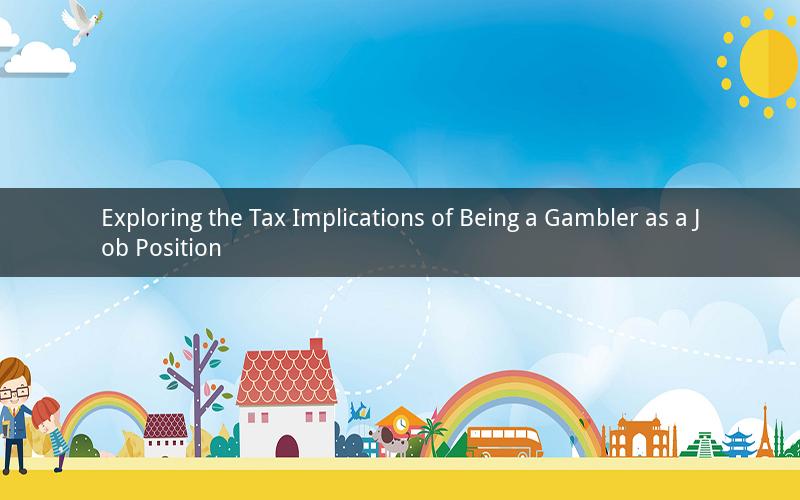
In the realm of employment, the term "gambler" may not immediately evoke the image of a traditional job position. However, for those who earn a living through gambling, the question arises: Is being a gambler a recognized job position for tax purposes? This article delves into the intricacies of this matter, providing insights into the tax implications of being a professional gambler.
Tax Implications of Being a Gambler
1. Taxable Income: Professional gamblers are generally required to report their gambling income as taxable income. This includes any winnings from casinos, sports betting, poker tournaments, or any other form of gambling activity. The key factor is whether the individual considers gambling as their primary source of income.
2. Self-Employment Tax: Unlike traditional employees who have taxes withheld from their wages, gamblers are considered self-employed. This means they are responsible for paying self-employment tax, which covers Social Security and Medicare taxes. The self-employment tax rate is 15.3%, consisting of 12.4% for Social Security and 2.9% for Medicare.
3. Deductions: Gamblers may be eligible for certain deductions to offset their gambling income. These deductions include business expenses directly related to their gambling activities, such as travel expenses, gambling equipment, and even a portion of their home office expenses if they use a designated area for gambling-related activities.
4. Record Keeping: Proper record-keeping is crucial for gamblers to substantiate their deductions and comply with tax regulations. This includes maintaining receipts, bank statements, and any other documentation that supports their gambling income and expenses.
5. Reporting Requirements: Gamblers must report their gambling income on Schedule C of their tax return. It is essential to accurately report all winnings, as failing to do so can result in penalties and interest.
Can Being a Gambler be Considered a Job Position for Tax Purposes?
1. Definition of a Job Position: To determine whether being a gambler can be considered a job position for tax purposes, it is important to understand the definition of a job position. A job position typically refers to a role or occupation that an individual holds in exchange for compensation. In this case, professional gamblers earn a living through gambling, which aligns with the definition of a job position.
2. Recognition by Tax Authorities: While there may not be a specific job title designated for professional gamblers, tax authorities recognize gambling income as taxable income. This recognition implies that being a gambler can be considered a job position for tax purposes.
3. Professional Gamblers vs. Hobby Gamblers: It is crucial to differentiate between professional gamblers and hobby gamblers. Professional gamblers earn a living through gambling, while hobby gamblers engage in gambling as a recreational activity. Tax regulations treat these two categories differently, with professional gamblers being subject to self-employment tax and other tax obligations.
5 Questions and Answers:
Q1: Can a professional gambler deduct their personal gambling losses?
A1: Yes, professional gamblers can deduct their personal gambling losses up to the amount of their gambling income. However, these deductions are subject to certain limitations and must be substantiated with proper documentation.
Q2: Are there any tax advantages for professional gamblers?
A2: Yes, professional gamblers can benefit from certain tax advantages, such as deductions for business expenses directly related to their gambling activities. These deductions can help offset their taxable income and potentially reduce their overall tax liability.
Q3: Can a professional gambler claim a home office deduction?
A3: Yes, if a professional gambler uses a designated area of their home exclusively for gambling-related activities, they may be eligible to claim a home office deduction. However, the deduction is subject to specific criteria and limitations.
Q4: Are there any tax implications for winning a large jackpot?
A4: Yes, winning a large jackpot is considered taxable income. Professional gamblers must report the full amount of the jackpot on their tax return and pay the applicable taxes on it.
Q5: Can a professional gambler contribute to a retirement account?
A5: Yes, professional gamblers can contribute to retirement accounts, such as an IRA or a 401(k). However, the contribution limits and eligibility criteria may vary depending on the specific retirement account and the individual's income level.
In conclusion, being a gambler can be considered a job position for tax purposes. Professional gamblers must report their gambling income, pay self-employment tax, and may be eligible for certain deductions. It is essential for gamblers to understand the tax implications and consult with a tax professional to ensure compliance with tax regulations.